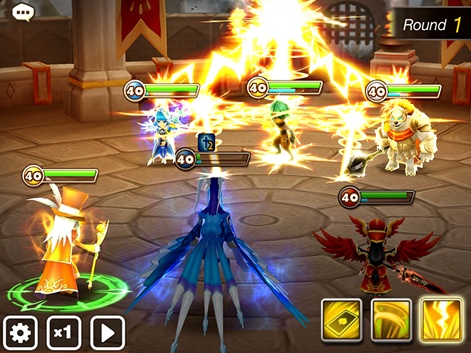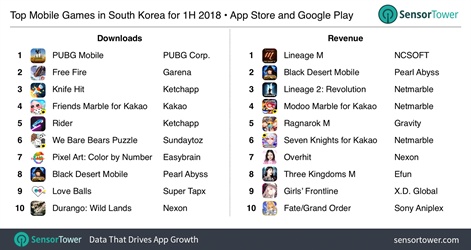South Korea’s games sector is one of the biggest in the industry. As we noted in a previous article in our South Korea Special, Newzoo claims the local games industry is worth as much as $5.6 billion.
According to the Korea Creative Content Agency, the mobile games market alone grew sales year-on-year by 24.3 per cent to $3.8 billion in 2017. The sector’s share of the entire Korean games market this year has increased to 39.7 per cent, with further growth anticipated.
The country is home to numerous billion-dollar games companies too. There’s Summoners War developer Com2uS and its parent company Gamevil, Lineage 2 Revolution publisher Netmarble, Lineage M firm NCSoft and Black Desert Online outfit Pearl Abyss.
Then there’s also Kakao, which has its own games division set to float on the secondary Kosdaq market, and Maplestory publishing giant Nexon - though the latter is headquartered in Tokyo.
And you might have heard of Bluehole and PUBG Corp, behind the worldwide PC, Xbox and mobile smash hit Playerunknown’s Battlegrounds, setting off a rush across the global games industry to the battle royale genre.
This week we’ve also been profiling various other successful companies in the region too, including Webzen, NHN Entertainment and Ekkorr.
The Korean games industry has entered a huge growth phase in the early '10s as the mainstream platform has shifted from PC online to mobile.Hyungjoo Lee
In short: it’s an industry that has spawned enormous games companies. And many of these experience a lot of their success at home, which is telling of just how lucrative the country’s games market is by itself.
Fast mobile-led growth
And while PC remains popular, mobile has spearheaded much of the growth of this industry in recent years.
“The Korean games industry has entered a huge growth phase in the early '10s as the mainstream platform has shifted from PC online to mobile,” Com2uS game business centre MD Hyungjoo Lee (pictured main, right) tells PocketGamer.biz.
“In 2012, a number of mobile games were launched through Kakao, one of Korea's major social platforms. Since then, the games market has grown rapidly due to the influx of a wide spectrum of users, such as female players as well as users of all ages.
“In 2017, the Korean games market has surpassed approximately 11 trillion won (around $10bn) in value, and for the first time, the mobile games market overtook the online games market.
“In addition, simulation RPGs such as Com2uS’s Summoners War and Netmarble’s Seven Knights started to become popular as the RPG genre became a trend. This also led to the big success of ARPGs, such as 4:33’s Blade.
“The trend has gradually been changing and currently MMORPGs such as NCSoft’s Lineage M Pearl Abyss’ Black Desert Mobile are leading the way.”
Pearly Abyss head of business division Youngchul Ham (pictured main, left) notes that, according to Pew Research Centre data, South Korea has the world’s highest smartphone ownership rate at 94 per cent.
Most of these devices have high-end specs and large screens, meaning users in the country can play these 3D MMORPGs without much performance trouble, if any.
Just as the quality of games, including graphics, continues to increase on other game platforms, we expect mobile games to evolve rapidly in the near future.Youngchul Ham
“Another reason for the popularity of mobile games in Korea can be attributed to the games’ mobile-customised UI and contents,” explains Ham.
“In our case, Black Desert Mobile is known for one of the best character customisation systems available, as well as industry-leading graphics and action that are hard to come by in mobile games.
“Just as the quality of games, including graphics, continues to increase on other platforms, we expect mobile games to evolve rapidly in the near future.”
Global opportunities
But it’s not just the local lucrative market where Koran companies are finding success. Increasingly, many are making good returns abroad.
In the past, developers hailing from Asian countries have found it difficult to expand internationally. Gree and DENA were burned by their attempts in the West, since refocusing on fortunes at home.
But Com2uS has made most of its revenue for $1billion-plus hit Summoners War abroad. For the $100m the developer made during the three months ending March 31st 2018 - 85 per cent of sales came outside of South Korea.

Netmarble meanwhile has also found international success with titles like Marvel Future Fight. It’s also made significant investments in Jam City and acquired Kabam to build up a localised portfolio - built from its fortunes a home.
“We are focusing on expanding our business into the global mobile games market rather than focusing solely on the saturated domestic market,” says Netmarble chief global officer Seungwon Lee (pictured main, centre).
We are focusing on expanding our business into the global mobile games market rather than focusing solely on the saturated domestic market.Seungwon Lee
He adds that mobile’s biggest strength is that these games are easier to bring to the global market, given they are free from physical limitations.
“As one of the leaders in the global mobile games industry, we see the key to garnering global gaming audience is culturalisation, which is far beyond simple language support,” states Seungwon Lee.
“We are dedicated to localising the games suitable to various regions that they enter. For instance, we are servicing different builds for Lineage 2 Revolution, one of the biggest hits from Netmarble, depending on the market it is servicing to provide the best gaming experience to players around the world.
"All builds are completely culturalised according to each region. Based on this know-how, Lineage 2 Revolution has achieved great success in some of the biggest and most advanced games markets, including North America and Japan.
“Currently, Netmarble is the biggest global player among Korean mobile games companies. We’ve successfully launched numerous titles in the global market, including Lineage 2 Revolution, and around 71 per cent of our total revenue came from overseas in H1 2017.
“We believe that our success in the global market has opened new doors for other Korean games companies as well.”

Mobile versus PC
While there are opportunities abound in mobile - what about other platforms? As we noted previously, there’s still a large audience hooked on PC, while console is languishing behind.
Ham claims while mobile has an outright lead, that doesn’t mean PC and console markets are shrinking drastically.
He admits that as more users move onto mobile, the number of PC users has decreased slightly, but there are still a significant number of long-time PC gamers and PC game rooms across the country are still bustling.
Console meanwhile is the smallest space, but its share could rise.
“In short, if I had to rank game platforms based on the opportunities present for each platform in Korea and the number of users, I would say mobile > PC > console," says Ham. "That’s because Korea has grown into a top three market for mobile games in terms of Google Play rankings.
“For us, we first developed Black Desert Online for PC, then redesigned the game to tailor to mobile devices. At the end of this year, we are also planning to launch the Xbox version of Black Desert in North America and Europe.
“Each platform may have a different number of users, but I think customising outstanding IPs for each platform can be a new opportunity in itself.”

Hyungjoo Lee expects the gap between mobile and online games to continue increasing further but feels there’s an opportunity set to grow in console.
Each platform may have a different number of users, but I think customising outstanding IPs for each platform can be a new opportunity in itself.Youngchul Ham
“Although console games account for only a small percentage in the Korean game market, the recent introduction of a 52 working hours per week system and the entry of large developers into the console market will activate and help console games grow its presence in the market,” he states.
Serious challenges
While the lucrative returns of the numerous big developers and publishers in South Korea paint a rosy picture of the sector, upon closer inspection there are some serious challenges facing the market.
For starters, it’s a heavily regulated industry. A Shutdown Law, also known as the Youth Protection Revision Act, went into effect in November 2011, which means users under the age of 16 cannot play online games between midnight and 6am. This limits the time open for this generation to interact with games and plays a part in stifling what is still a popular esports sector.
The lucrative nature of the Korean market isn’t a closed secret either. The rest of the industry wants in. Western developers and publishers, like Ketchapp, are racking up high numbers of downloads on mobile, while rivals in Japan, and particularly China, are fighting for spots on the top grossing lists. Yet as a mature market, there are only limited returns, albeit large ones, to fight over.

China’s insurgency is a particularly sore spot for Korean companies. China has frozen licences for Korean devs as part of a response to the country’s THAAD missile defence system built in partnership with the US.
The goal of the system is said to be to help the US protect itself and its allies from perceived threats such as North Korea, but China claims the deployment threatens its own security.
Although the size of the market has increased, it is necessary for Korean developers to aggressively advance into the global market.Hyungjoo Lee
The ban has been in place since March 2017 and shows little sign of ending. This is separate and potentially longer-lasting than China's current game licensing freeze affecting the entire global games sector.
“Although the size of the market has increased, it is necessary for Korean developers to aggressively advance into the global market,” states Lee.
Ham says that even in the midst of political and social issues surrounding games, he believes the biggest challenge facing the industry today by far is the demand for high-quality games.
While the big publishers might be able to handle this, the news is bodes less well for indies. At last year’s G-STAR - South Korea’s biggest games B2C and B2B show - a number of developers told PocketGamer.biz that the sector was becoming tough for indies as big companies dominated the mobile charts.
“The chances of indie mobile games surviving in today’s market are extremely low,” says Ham.
“The same can be said for mobile games with extravagant graphics but predictable content. The reality is that gamers’ standards are rising more rapidly than developers expect and they need to be ready to meet such tough demands.”
Come together
When any group of developers are asked about local collaborations - the answer is always that of course they work together and share ideas. It’s not always something that’s reflected in reality, however.
The Finnish games industry is perhaps one of the leaders in actually sharing knowledge, with the belief that a rising tide lifts all boats.
The fact that so many companies are publicly listed in South Korea may make it difficult to work together, but there are various events that developers can use help pass on learnings.

Lee says companies share strategies at events hosted by various government organisations and other platforms such as Google Play. On top of that, he claims there’s also active communication and an exchange of information between firms within associations and developer community groups.
Ham meanwhile names various offline events similar to GDC have popped up over the last few years.
The chances of indie mobile games surviving in today’s market are extremely low.Youngchul Ham
“For instance, Korea’s leading game webzine Inven has been hosting the Inven Game Conference for the past four consecutive years, bringing together game developers for the purpose of sharing industry knowledge,” he says.
“Nexon, the oldest game company in Korea, also hosts the Nexon Developers Conference (NDC) every year. Other than that, there are quite a few anonymous developer communities that share industry knowledge, and Pearl Abyss also hopes to host our very own developers’ conference one day.”
Eyes on the future
As the South Korean games industry heads into the future, there’s a mixture of things to be happy about - including being one of the most lucrative games market in the world - and serious concerns such as heavy regulation and fierce global competition.
There’s room for further growth in the esports scene, thanks to the ability to play games on any device - Fortnite’s cross-platform nature will surely prove a notable breakthrough for Korean developers - and the growing streaming space thanks to Twitch.
Local companies have also built up large and recognisable IP that can be spun off into other sectors, from animation and film to merchandising opportunities.
“The Korean games industry recorded double-digit growth in both sales and exports last year,” says Lee.
“As the game industry accounts for more than half of the nation's total cultural content exports, it has become a new growth engine for the future. The future of the Korean games industry seems highly promising and it is expected to grow further in many aspects.”
Ham strikes a more sombre note on the industry’s future. Expanding on his earlier thoughts, he states developers have to constantly provide high-quality games that meet consumer standards, with these expectations also reaching to mobile.
“That’s why I don’t think the future of the Korean games industry is very promising,” he explains.
“There are very few developers worldwide that can meet such high standards and if we narrow it down to just Korea, there are even fewer developers that can deliver.
“However, it is true that game content is consumed at a rapid rate in Korea, and there are efforts being made to foster the next generation of talent via specialised high schools and universities.
“Judging by the promising new talent as well as the number of new developers entering the workforce, I say there is still hope for the Korean games industry.”
Join Steel Media and Jagex Partners to explore the Korean market first hand at G-STAR, the biggest games conference in the region. We're running the finale of the Big Indie Awards, two Big Indie Pitches and a PG Party in association with Persona.ly, Jagex and G-Star, whilst Jagex is launching its Jagex Partner program, looking to connect with developers and publishers in the 'living games' space.
This article is part of our South Korea Special running all through this week.

















